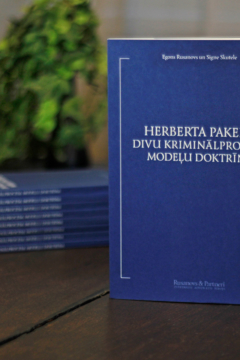Author: Egons Rusanovs and Signe Skutele
12EUR
In the scientific monograph Dr. iur. cand. Egons Rusanovs has focused on the genesis and further evolution of the criminal procedure doctrine in the interwar period of the Republic of Latvia (1918–1940), analysing the criminal procedure problems of the selected period.
As the author has admitted, the range of practical problems of the application of criminal procedural institutes and legal enactments discussed in the doctrinal-theoretical dimension both in the inter-war period and in contemporary Latvian criminal procedure has surprisingly remained unchanged in its real essence. Like today, the focus of the legislator and legal practitioners of the inter-war period was the question of the ability to find a compromise between the efficient conduct of criminal proceedings and the doctrinally developed understanding of the role of the individual’s legal guarantees.
The first chapter of the book, «The overall historical context of the Late Modern Period at the beginning of the Age of Revolutions discourse of criminal procedure doctrine in continental Europe», analyses the origins and directions of development of continental European criminal procedure doctrine in the 19th century, taking into account the objectives of the initiators of the judicial reform of the Russian Empire and the theoretical transfer and implementation of continental European criminal procedure doctrine in the Russian model of criminal procedure. The second chapter, «Problems of criminal procedure in the interwar period of the Republic of Latvia and theoretical discussions as a doctrine of criminal procedure», in keeping with the dual nature of the term «doctrine», includes an overview of the nature of the current theoretical discourses of the interwar period, as well as an assessment of the fundamental paradigm shift that served as the basis for the general evolution of the doctrine of criminal procedure in the interwar period of Latvia.
In the third chapter «The organisation of the court’s preliminary inquiry in the doctrinal discourse of the criminal procedure of the interwar period in the Republic of Latvia», the author focuses on the nature of the court’s preliminary inquiry and the analysis of this stage as reflected in the doctrine of the criminal procedure of the inter-war period in Latvia. The author concludes the monograph with an analysis of the evolution of the doctrine of criminal procedure in two separate periods and systems of government – the ages of democracy and of authoritarianism. The analysis of the results and practical application of the reforms actually implemented, which continued to develop the content of Latvian criminal procedure doctrine up until the occupation, is present in this work.
The questions addressed in the book will be of interest not only to those interested in and studying legal theory, history, and philosophy, but also to legislators and practitioners of criminal law, providing answers about the origins and justification of particular legal constructs. The insight offered by the author into the organisational nature of preliminary investigations could be useful material for the Justices of the Supreme Court when looking to resolve doctrinal-theoretical disputes, for example, on the use of the results of pre-trial criminal proceedings as evidence and their prejudicial effect. Perhaps the study will allow a different perspective on the constitutionality defects related to criminal procedural rules, which have come to the attention of the Constitutional Court in recent years.
This book is only available in Latvian.
Pages: 495
Cover: Soft covers
Publisher: «Rusanovs & Partneri» office of sworn advocates SIA
Year: 2023
25 EUR
Author: Egons Rusanovs and Signe Skutele
12EUR
